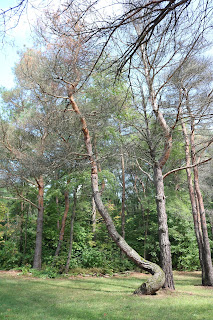 |
| Award-winning sequel, The Twisted Climb - Darkness Descends |
I often use personal experience when writing - if it's something I've heard or empathized with, or witnessed with my own eyes, my own heart, then I can write about it from my perspective. Personal experience often lends a more credible telling of the tale and hopefully lead to a closer connection with the reader. I use my home and sailing experiences in both The Twisted Climb and Darkness Descends. For example, shortly after we bought our property, we discovered 20-year-old vines twisted around many of our pine trees. They had slowly died a 'strangled' death. I used that twisted vine experience in the 'Drunk on a Slinky' chapter of Darkness Descends. Another example is from my sailing vacations. We sail to a gorgeous place called The Bad River, home to the Devil's Door Rapids, and I used these places as dream world locations in Darkness Descends.
My home is in a rural area surrounded by thousands of trees and nature in all its forms - birds, deer, racoons, porcupines, skunks and our neighbour's Guinea Hens, chickens and geese. So when I came home from our August sailing vacation, I was saddened to see a good number of our pine trees in distress. The needles were reddish-brown and the bark was splitting. My partner and I were walking around the property, wine glass in hand, when we stopped to listen to an unusual sound. It was a crunching sound and the source was one of the pine trees beside the man-cave/shop.
My heart wrenched.
I'd heard about this sound.
 |
| Adult pine bark beetle |
This munching sound. The sound of hungry mouths chewing and chewing and destroying.
It was the sound of ten thousand hungry pine bark beetles.
These are voracious little fother-muckers that destroy swaths of trees. From Mexico all the way to British Columbia and now, Ontario, these pests are destroying pine trees wherever they fly and lay eggs.
We live near a provincial forest and are also surrounded by Christmas tree farms. Many of the tree farm properties have been decimated by these pests and, until now, I felt badly for them but never once thought that the trees on my property would be subject to the horrible critters. The provincial forest had a controlled burn this past spring in an attempt to halt the pests from spreading.
Yeah, well, that didn't help me or my trees.
I'm researching ways to halt the spread of these destructive insects and save the healthy trees. This is what I've learned from the 'Net:
Bark
beetles kill the host tree when the adults bore holes through the tree’s
outer bark and
into the inner bark layer of the tree. The adult beetles then
excavate tunnels where the female beetle lays
eggs.
When the eggs hatch, the grub stage (larvae) further damages
the inner
bark layer as they construct feeding galleries.
Eventually, the combined
excavation by adults and larvae will
girdle or encircle the tree’s inner bark
and cause death.
Further to the above, it seems that the best way to eliminate the beetle is to cut the tree down in the winter. And then 'chop and burn.'
My partner and I are on a new mission: Beat the Beetle. And take care of our forest.
This is a battle we don't want to lose. Our trees are counting on us :(
 |
| Several of the pines along our driveway are plagued with the beetle. Note the reddish-brown needles. |
 |
| My favourite twisted pine is also infested. |
 |
| Looking upward, this pine tree is 'home' to thousands of the beetles. It's where we first heard the 'munching' sound. |
J.C. Kavanagh
The Twisted Climb - Darkness Descends
(Book 2)voted BEST Young Adult Book 2018, Critters Readers Poll and Best YA Book FINALIST at The Word Guild, Canada
AND
The Twisted Climb,
voted BEST Young Adult Book 2016, P&E Readers Poll
Novels for teens, young adults and adults young at heart
Email: author.j.c.kavanagh@gmail.com
www.facebook.com/J.C.Kavanagh
www.amazon.com/author/jckavanagh
Twitter @JCKavanagh1 (Author J.C. Kavanagh)

































.jpg)


